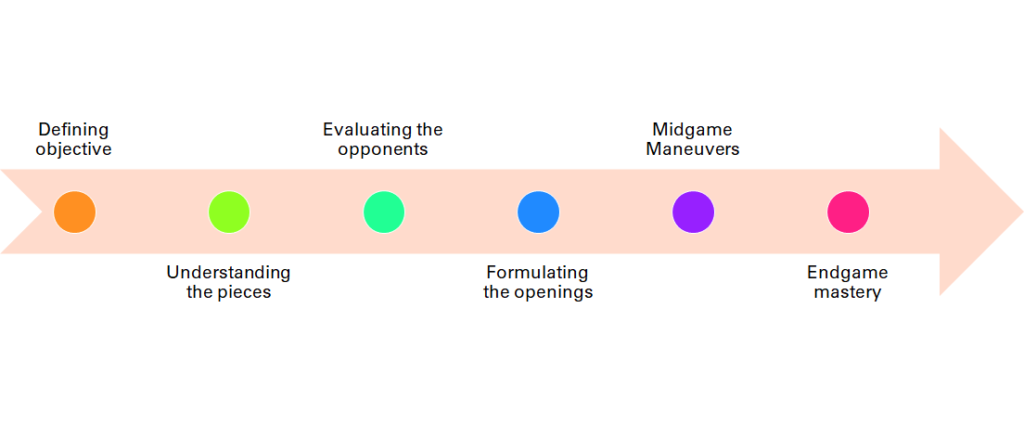Imagine yourself standing on a vast and vibrant chessboard, with your opponent’s strategizing their every move. The game represents the competitive business landscape, where success hinges on developing a winning strategy. In this blog post, we embark on a journey of strategic formulation, exploring how it parallels the art of playing chess. Through intriguing analogies and storytelling, we unravel the secrets of effective strategy development that can lead organizations to triumph.
The Chessboard Analogy
The chessboard serves as a powerful metaphor for the complex and dynamic nature of the business world. Just as a chess player navigates the board, businesses must navigate their industry’s terrain, understanding the interplay of competitors, customers, market trends, and resources. Similar to how a chess player crafts moves to outmaneuver opponents; organizations must develop a competitive strategy that positions them for success.

Defining the Objective: The King’s Quest for Survival:
In chess, the objective is to protect the king while plotting the downfall of the opponent’s king. Similarly, businesses aim to secure their market position and outperform competitors. The analogy reveals the significance of formulating a clear objective that aligns with the organization’s mission, values, and desired outcomes.
Understanding the Pieces: Analyzing Internal Capabilities:
Just as each chess piece possesses unique abilities, businesses must assess their internal capabilities and resources. The analogy highlights the importance of understanding strengths, weaknesses, core competencies, and distinctive features that can provide a competitive advantage. Analyzing the pieces enables organizations to make informed strategic decisions.
Evaluating the Opponent: Scanning the Competitive Landscape:
In chess, players carefully observe their opponent’s moves, anticipate their intentions, and adapt their strategies accordingly. Similarly, businesses must conduct a thorough analysis of the competitive landscape. By assessing rival organizations, market trends, customer behaviors, and industry dynamics, they gain insights to make strategic choices that capitalize on opportunities and counter threats.
Formulating the Opening: Crafting a Differentiation Strategy:
In chess, the opening moves set the stage for the entire game, establishing positions, controlling space, and initiating attacks. Likewise, organizations must craft a differentiation strategy that sets them apart from competitors. They must identify unique value propositions, target specific market segments, and communicate their distinctive offerings to gain a competitive edge.
Midgame Maneuvers: Flexibility and Adaptability:
Chess players adapt their strategies based on changing circumstances during the midgame. Similarly, organizations must exhibit flexibility and adaptability in their strategic formulation. The analogy emphasizes the need to continuously monitor the market, consumer preferences, and emerging trends, adjusting strategies to maintain a competitive position.
Endgame Mastery: Execution and Implementation:
The endgame in chess requires precision and flawless execution to secure victory. In business, effective strategy formulation must be accompanied by meticulous execution and implementation. The analogy underscores the significance of aligning resources, building capabilities, and relentlessly pursuing strategic goals to achieve desired outcomes.
Conclusion:
As we conclude our immersive exploration of developing a competitive strategy through effective formulation, we realize that playing to win in the business world is akin to playing chess. By embracing the chessboard as a metaphor for the competitive landscape, organizations can unlock the secrets of strategic formulation, leveraging analogies and storytelling to understand the intricacies of developing a winning strategy.
So, dear strategists, let us approach strategic formulation like a chess grandmaster, envisioning the moves, understanding the pieces, and outmaneuvering competitors. As you immerse yourself in the fascinating world of strategy development, remember that playing to win requires careful analysis, adaptability, and flawless execution. May your strategic endeavors lead you to triumph in the captivating game of business.